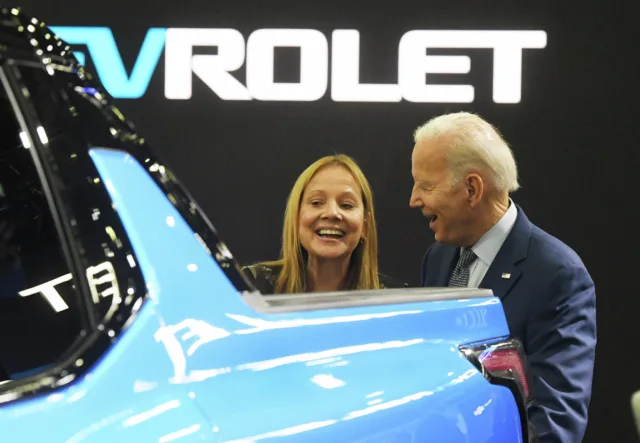
General Motors Chair and CEO Mary Barra shows President Joe Biden a Silverado EV at the GM display during the 2022 North American International Auto Show in Detroit. While Biden supported measures to encourage EV adoption, his successor has done the opposite, leading GM and other automakers to expect lower sales of electric models in the months ahead.
General Motors Co. said Tuesday it has sunk roughly $1.6 billion into electric vehicle manufacturing capacity it’s no longer using because of shifting federal auto policies under President Donald Trump.
The Detroit automaker reported the loss to the Securities and Exchange Commission as an impairment charge, which reflect assets that are no longer expected to produce profits as initially expected.
Article continues below this ad
“Following recent U.S. Government policy changes, including the termination of certain consumer tax incentives for EV purchases and the reduction in the stringency of emissions regulations, we expect the adoption rate of EVs to slow,” GM said in its filing. “These developments have caused us to reassess our EV capacity and manufacturing footprint.”
Until this year, EVs were considered to be the future of the U.S. automotive industry, which is now being whipsawed as the Trump administration moves to undo incentives for automakers to go electric.
Beyond last month’s termination of an EV tax credit that had been worth $7,500 for buyers of new EVs and up to $4,000 for used ones, the Environmental Protection Agency has been working on easing rules aimed at cleaning up auto tailpipe emissions. Trump has also challenged federal EV charging infrastructure money and blocked California’s ban on new gasoline-powered vehicle sales.
Article continues below this ad
It all adds up to less reason for GM and other automakers to continue evolving their production away from gas-burning vehicles.
In its filing, GM said it had “made significant investments and contractual commitments in the development of electric vehicles (EVs) to help the Company’s vehicle fleet comply with emissions and fuel economy regulations that were scheduled to become increasingly stringent.”
It also warned it may take additional hits as it adjusts production, with non-cash charges potentially impacting operations and cash flow in the future.
The company announced in 2020 that it was going to invest $27 billion in electric and autonomous vehicles in the next five years, a 35% increase over plans made before the pandemic. In 2021 it said it planned to have more than half of its factories in North America and China be capable of making electric vehicles by 2030. It also pledged to increase its investment in EV charging networks by nearly $750 million through 2025.
Article continues below this ad
A year later, GM CEO Mary Barra said the automaker would sell more electric vehicles in the U.S. than Austin’s Tesla Inc. by the middle of the decade. GM also had a goal of making the vast majority of the vehicles it produces electric by 2035, and the entire company carbon neutral, including operations, five years after that.
Now, in addition to the drastic changes from one administration to the next, U.S. automakers are facing increased competition from companies such as China’s BYD, which announced in July that its sales grew 31% in the first six months of the year to 2.1 million cars.
BYD’s sales have skyrocketed on the back of a government-driven EV boom in China. The rise of BYD and other Chinese electric vehicle makers is a challenge for Tesla and the world’s other major automakers as Chinese competitors push into Europe, Southeast Asia and other overseas markets with a relatively affordable option for drivers who want to go green.
As BYD gains, Tesla sales have been declining in Europe and Asia for reasons including the flagging popularity of CEO Elon Musk, his company’s aging lineup of vehicles and increasing market options.
Article continues below this ad
GM more than doubled its electric vehicle sales in the third quarter compared with the same period a year ago, largely due to drivers hoping to take advantage of the tax credits before they expired Sept. 30. Tesla saw its sales increase 7% to a record. Though the total easily beat Wall Street expectations, other EV makers reported bigger increases. Rivian, for example, saw sales jump 32%.
Analysts predict a steep drop-off in sales by Tesla and other EV makers in the coming months.
GM shares fell about 2% to close Tuesday at $57.15.
Article continues below this ad









